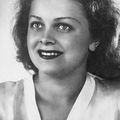
Lyudmila Tselikovskaya was a Russian film and stage actress, and unofficial sex symbol in the 1940s Soviet Union. She was loved by general public, but was censored under the dictatorship of Joseph Stalin. She was born Lyudmila Vasilyevna Tselikovskaya on September 8, 1919, in Astrakhan, Russia. Her father, Vasili Tselikovsky, was an orchestra c... more
Lyudmila Tselikovskaya was a Russian film and stage actress, and unofficial sex symbol in the 1940s Soviet Union. She was loved by general public, but was censored under the dictatorship of Joseph Stalin.
She was born Lyudmila Vasilyevna Tselikovskaya on September 8, 1919, in Astrakhan, Russia. Her father, Vasili Tselikovsky, was an orchestra conductor, her mother was an opera singer. Young Tselikovskaya studied piano at the Gnesin School of Music in Moscow, then, from 1937 to 1941 she studied acting at the Shchukin Theatrical School of the Vakhtangov Theatre, graduating in 1941 as an actress.
From 1941 to 1992 Lyudmila Tselikovskaya was a member of the troupe at Vakhtangov Theatre in Moscow. There her stage partners were such actors as Mikhail Ulyanov, Ruben Simonov, Boris Zakhava, Mikhail Astangov, Varvara Popova, Vasiliy Lanovoy, Irina Kupchenko, Yuliya Borisova, Lyudmila Maksakova, Marianna Vertinskaya, Nina Ruslanova, Nikolai Plotnikov, Yuriy Yakovlev, Vladimir Etush, Vyacheslav Shalevich, Andrei Abrikosov, Grigori Abrikosov, Boris Babochkin, Nikolai Gritsenko, Nikolai Timofeyev, Evgeni Fedorov, Aleksandr Grave, Vladimir Koval, Viktor Zozulin, Evgeniy Karelskikh, Sergey Makovetskiy, and Ruben Simonov, among others. Tselikovskaya gave memorable performances in the classic Shakespeare's plays, such as Juliet in 'Romeo and Juliet', and Beatrice in 'Mnogo shuma is nichego' (aka.. Much Ado about Nothing).
At the beginning of her film career, Tselikovskaya gave a stellar performance in Ivan the Terrible, Part I (1945) by director Sergei M. Eisenstein. However, Joseph Stalin canceled her nomination for Stalin's Prize, and as a consequence, Tselikovskaya did not have any official support for the rest of her career. During the Second World War Lyudmila Tselikovskaya entertained the Red Army troops at the front-lines together with her husband, actor Mikhail Zharov. However, after the war, she and Zharov were censored by the Soviet officials, and both became virtually unemployed.
In 1948 Tselikovskaya married Karo Alabyan, a prominent architect, but soon he was falsely accused of anti-Soviet activity, was fired from all government projects, became depressed, and later died of cancer. For the next 15 years, Tselikovskaya lived in a civil union with director Yuri Lyubimov, and their home in Moscow was a meeting place for such cultural figures as Boris Pasternak, Petr Kapitsa, Vladimir Vysotskiy, Fedor Abramov, Evgeniy Evtushenko, and other Russian intellectuals. At the same time, Tselikovskaya did not have new roles to play, she was ignored by official Soviet critics, and was rarely mentioned in the Soviet press. However, she was still loved by general public, and was eventually designated People's Actress of Russia. She died of cancer on July 2, 1992, in Moscow, Russia.
- IMDb Mini Biography By: Steve Shelokhonov
close